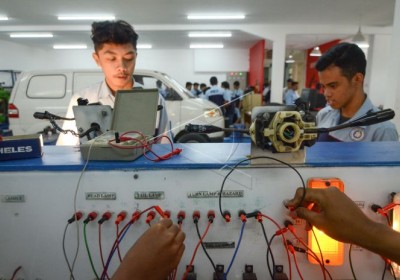With only 10 thousand Rupiah as initial investment, a once school-drop-out finally managed to earn a Bachelor Degree
February 27, 2019
Antara Photos
Inclusive vocational education is a solution for workers who have limited funds, mobility, and access. How did you do it?
"Many underestimate me because I only graduated from the C Package education (evening schools for drop-outs of formal schools), but I don’t feel inferior. After all, I have skills and a permanent job," said Marta as quoted in Cahaya Pembawa Asa (or “The Light that Brings Hope”) published by Cinta Anak Bangsa Foundation.
Dropping out of school, Marta Yunita Wati Hasibuan joined Duri Kepa Learning House, West Jakarta. With only Rp.10 thousand per month, Marta could go to a package C diploma school and acquired a certified vocational education. She chose to learn about computers, English, and web designing. She went to public school in the morning and received vocational education in the afternoon.
After graduating, Marta was accepted to work in a multi-filling position in the Consumer Credit Business Unit. While working, she continued her education at a private university. She managed to obtain her bachelor's degree and work for a more established position at Sutramas Lane, a sole distributor company.
Marta is one example people of high school education who could find a good job. According to data from the Central Statistics Agency (BPS) as of August 2018, the open unemployment rate for vocational high school graduates was still the highest compared to other levels of education. The number reached 11.24 percent of the total number of graduates. While open unemployment for high school graduates was 7.95 percent.
“Unemployment occurs because job seekers do not match with job opportunities," said Minister of National Development Planning / Head of the National Development Planning Agency (Bappenas), Bambang Brodjonegoro, when launching the Indonesia Development Forum 2019, last January.
Therefore, Bambang said, the government is improving vocational education by connecting educational institutions with industry to improve the curriculum. Cooperation between educational institutions and businesses is mutually beneficial. The vocational curriculum is better because it is in accordance with the demands of the market. And also, companies can find human resources that fit their needs.
Responding to that, the Chief Executive Officer of General Electric Indonesia, Handry Satriago said, if asked by the government, he was willing to cooperate with educational institutions. In relation to industrial revolution 4.0, Handry said that data processing and digital equipment operating personnel are the most needed ones. Not all vocational graduates are able to meet this demand.
Handry suggested the government could urge the industry to invest in the field of human resources. They can make vocational schools, research institutions, or vocational training centres. If necessary, he said, multinational companies can bring renowned lecturers or experts to teach skills to vocational students.
One way to create decent and equitable employment opportunities is by conducting inclusive vocational education. According to the Program Assistant of Inequality of the International NGO Forum on Indonesian Development (INFID) Megawati, inclusive vocational education is education that is easy to access by everyone, both in terms of location and cost.
"Inclusive vocational education targets all vulnerable groups such as women, people with disability, as well as those who have limited access to education," Mega said when met at INFID's office in early February.
Vocational education is not only implemented by vocational schools which are supervised by the Ministry of Education and Culture, but also the vocational training centres (BLK) which are managed by the Ministry of Manpower. To achieve the target, INFID SDGs Program Officer, Bona Tua Parlinggoman Parhusip, said together with the Civil Society Coalition they have extended recommendations to the government.
First, the government needs to consider reallocating the education budget not only for educational institutions but also for non-institutional vocational education. Secondly, the government needs to invest in employment sector by allocating a budget to build vocational training centre facilities. The gaps between the training centres (BLK) managed by the central government and those of the local government need to be addressed.
"Many of the central BLKs are modern and well equipped, while in the regions, it is not the case. This greatly affects the learning process of students," Bona said.
Third, the involvement of companies, schools, and other stakeholders is needed, including research support from universities. Bona explained philanthropic institutions or social foundations could contribute to providing job training.
One philanthropic institution that focuses on vocational education and training is the Cinta Anak Bangsa Foundation (YCAB). YCAB founder and CEO, Veronica Colondam, said the agency focused on women's education and empowerment. YCAB integrates public schools with diverse vocational skills.
"Vocational facilities that are empowering. Not only can you get the knowledge, you are skilled, but you are unemployed because you cannot get access to the market," Veronica said.
YCAB has established 55 Study Houses throughout Indonesia. In addition to the diploma students obtain when they graduate, a variety of skills according to their respective interests will also be added. Some of them include computer courses, sewing, beauty courses, batik making courses, information technology, workshops, and gadget repair. The total number of graduates has reached 2.9 million since YCAB was founded 20 years ago.
The involvement of non-government institutions such as YCAB is needed to improve vocational education and to create an opportunity to get decent work. Bappenas, through the Indonesia Development Forum, gathered input from all stakeholders to formulate research-based policies and good practices. This international forum will carry the theme Mission Possible: Seizing the Opportunities of Future Work to Drive Inclusive Growth.
Indonesia’s Research Institutions Supporting the Development of the Electric Vehicle Industry
Indonesian Muslim Fashion and Cosmetics IKMs Shine at Dubai World Expo 2020
Govt Steps Up UMKM Transformation Efforts in the Midst of Pandemic Slowdown
Govt Encourages Promotion of IKM Products in Digital Era
Government Begins Developing Maritime Training Center in Makassar
Tweets by IDDevForum
